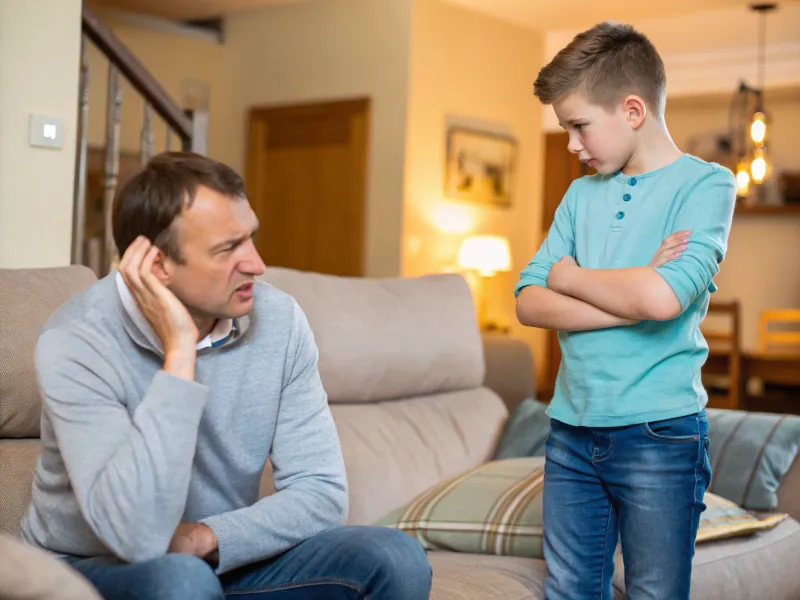Some parents think they did everything right—until their adult kids vanish from their lives. No calls. No visits. Just… silence. Sound familiar? If you’re wondering why this happens, you’re not alone. More adults than ever are choosing to cut ties with their parents, and it’s not just the kids who are changing.
Cultural shifts, mental health awareness, and generational differences have reshaped family dynamics. It’s a complex mix of emotional neglect, suffocating control, and endless guilt trips that push them to make this heart-wrenching decision.
So, what’s driving this modern trend of family estrangement? Here’s a deep dive into 32 traits that parents might unknowingly exhibit, making their adult children want out of the relationship. Let’s explore these traits, not as a judgment, but as a chance to understand and maybe, just maybe, break the cycle.
1. Manipolazione emotiva
Vi è mai capitato di avere una conversazione in cui ogni parola che avete detto è stata ribaltata contro di voi come in un incontro di jiu-jitsu verbale? Questa è manipolazione emotiva ed è estenuante. I genitori che usano questa tattica possono far sentire in colpa i figli o fare la vittima per influenzare le decisioni a loro favore. È un modo sottile e insidioso per mantenere il controllo, lasciando i figli adulti con la sensazione di essere sempre nel torto.
Immaginate di crescere in un ambiente in cui le vostre emozioni vengono costantemente manipolate. È come camminare su gusci d'uovo, sempre in dubbio. Questo crea una base tossica per le relazioni, dove l'amore è condizionato e l'approvazione sembra sempre fuori portata. Da adulti, i bambini riconoscono quanto sia dannoso questo comportamento e possono scegliere di allontanarsi per la loro salute mentale.
Liberarsi dal ciclo della manipolazione emotiva richiede consapevolezza di sé e, a volte, un aiuto professionale. Si tratta di recuperare la propria voce e di stabilire dei limiti. Non si tratta solo di un problema per il bambino, ma di un campanello d'allarme per i genitori che devono riflettere sulle loro azioni.
2. Controllo prepotente
Immaginate un burattinaio che tira i fili e detta ogni mossa della marionetta. Ecco come ci si sente a esercitare un controllo prepotente. Alcuni genitori credono di sapere tutto e cercano di imporre ogni aspetto della vita dei figli, dalle scelte professionali alle relazioni personali. Questo può far sentire i figli adulti soffocati e desiderosi di libertà.
In una dinamica di questo tipo, la voce del genitore soffoca i desideri e le aspirazioni del figlio. L'interferenza costante può portare al risentimento, mentre il bambino lotta per trovare la propria strada. Non si tratta solo di una guida, ma di imporre la propria volontà, spesso mascherata da preoccupazione.
Staccarsi da questo controllo significa trovare la propria identità e imparare a fidarsi di se stessi. È un viaggio difficile, pieno di sensi di colpa e di dubbi, ma essenziale per la crescita personale. I genitori devono imparare a lasciarsi andare, abbracciando l'individualità del figlio.
Vedi anche: 32 Sad But True Reasons Adult Children Cut Ties With Their Parents
3. Critica costante
Immaginate di vivere sotto un microscopio, con ogni azione analizzata e giudicata duramente. Ecco come si sentono le critiche costanti di un genitore. Non si tratta solo di sottolineare i difetti, ma di una negatività pervasiva che erode l'autostima e genera insicurezza.
Quando le critiche sono la norma, i bambini crescono con la convinzione di non essere mai abbastanza bravi. Questo può creare un persistente dubbio su se stessi che li perseguita fino all'età adulta. Il costante bombardamento di negatività può soffocare la creatività e far sembrare impossibile l'assunzione di rischi, intrappolandoli in un circolo vizioso di paura e ansia.
Per i figli adulti, allontanarsi da un ambiente critico è un passo verso l'accettazione di sé e la fiducia. Si tratta di sentire le proprie affermazioni positive al posto dell'eco delle critiche del passato. I genitori devono comprendere l'impatto delle loro parole e sforzarsi di incoraggiare piuttosto che criticare.
Vedi anche: 27 motivi per cui i figli non sopportano i genitori una volta cresciuti
4. Trascuratezza emotiva
L'abbandono emotivo è come essere circondati da persone ma sentirsi completamente soli. È quella fredda indifferenza che fa sentire un bambino invisibile e inascoltato. I genitori possono essere fisicamente presenti ma emotivamente non disponibili, lasciando i figli affamati di legami e di conferme.
Crescere in un ambiente emotivamente trascurato può portare a sentimenti di indegnità e solitudine. Immaginate di desiderare un caldo abbraccio o una parola di incoraggiamento, ma di ricevere invece il silenzio. Questo vuoto può essere emotivamente invalidante, con ripercussioni sulle relazioni future e sull'immagine di sé.
Scegliere la distanza può essere un modo per guarire e cercare il sostegno emotivo che non si è mai ricevuto. I genitori potrebbero non riconoscere i loro modi negligenti. Comprendere l'importanza della presenza emotiva e impegnarsi attivamente con i figli può aprire la strada alla riconciliazione.
5. Incolpare e svergognare
Il biasimo e la vergogna sono due gemelli tossici che prosperano nel far sentire gli altri piccoli. Alcuni genitori usano queste tattiche per sviare le responsabilità e mantenere il controllo, lasciando i figli oppressi dal senso di colpa e dalla vergogna. Questo comportamento distruttivo può erodere l'autostima e danneggiare il rapporto genitore-figlio.
I bambini cresciuti in un ambiente di questo tipo spesso interiorizzano la colpa, credendo di essere intrinsecamente difettosi. Questo può manifestarsi in età adulta come bassa autostima e difficoltà a fidarsi degli altri. La costante vergogna crea una narrativa di fallimento che è difficile da scrollarsi di dosso.
Creare distanza può essere l'unico modo per liberarsi da questi schemi dannosi e ricostruire la propria autostima. I genitori, d'altro canto, devono riconoscere la danni delle loro parole e azioni.
6. Mancanza di confini
Immaginate di avere uno spazio personale pari a zero, dove ogni decisione e azione viene esaminata. Ecco cosa significa la mancanza di confini con alcuni genitori. Magari hanno le migliori intenzioni, ma senza rispettare i confini si intromettono nella vita del figlio, facendolo sentire esposto e vulnerabile.
Questa confusione di confini può creare un ambiente in cui il bambino sente di non avere autonomia. È come se la loro vita fosse costantemente sorvegliata, rendendo difficile lo sviluppo di un senso di sé. La mancanza di privacy può soffocare la crescita personale e creare una dipendenza difficile da spezzare.
Stabilire dei confini è fondamentale per l'indipendenza e la scoperta di sé. Si tratta di fissare dei limiti e comunicare chiaramente le proprie esigenze. Nel frattempo, i genitori devono imparare a rispettare questi confini, comprendendo che la privacy del bambino è essenziale per il suo sviluppo.
7. Illuminazione a gas
Il gaslighting è come vivere in un labirinto in cui la realtà è costantemente distorta. Alcuni genitori usano questa manipolazione psicologica per far sì che i figli dubitino delle proprie percezioni e dei propri ricordi, creando un senso di confusione e di impotenza.
Immaginate di sentirvi dire che le vostre sensazioni ed esperienze non sono valide, che state esagerando o immaginando le cose. Questo può portare a dubbi su se stessi e a un senso distorto della realtà, rendendo difficile fidarsi di se stessi o degli altri. È una tattica che mina la fiducia in se stessi, lasciando il bambino perennemente in dubbio.
Riconoscere il gaslighting è il primo passo per recuperare la propria realtà e liberarsi dalla manipolazione. Si tratta di fidarsi del proprio istinto e di cercare conferme da fonti di supporto. Nel frattempo, i genitori devono comprendere l'impatto di questa manipolazione e impegnarsi per una comunicazione onesta e trasparente.
8. Narcisismo
Il narcisismo in un genitore è come essere un attore non protagonista in uno spettacolo individuale. Tutto ruota intorno a loro: i loro bisogni, i loro risultati, la loro immagine. I figli si sentono spesso messi in ombra e sottovalutati, come se la loro esistenza servisse solo a rafforzare l'ego del genitore.
Crescere con un genitore narcisista significa vivere in un mondo in cui l'amore è condizionato, basato sulla conformità e sull'ammirazione. I bisogni del bambino sono secondari, spesso ignorati o respinti. Questo può portare a sentimenti di inadeguatezza e a una costante ricerca di approvazione, che può protrarsi anche in età adulta.
Fare un passo indietro rispetto a un genitore narcisista può essere un percorso verso la scoperta di sé e dell'autostima. Si tratta di trovare il valore dentro di sé piuttosto che cercarlo all'esterno. I genitori devono rendersi conto che una relazione sana non è una strada a senso unico.
9. Invalidare i sentimenti
Invalidating feelings is like dismissing someone’s reality, telling them their emotions don’t matter. Some parents do this unintentionally, brushing off their child’s feelings as irrational or unimportant. This dismissal can leave children feeling misunderstood and emotionally isolated.
Immaginate di sentirvi dire che le vostre paure o gioie sono insignificanti. Con il tempo, questo può portare a dubbi su se stessi e a una riluttanza a esprimere le emozioni, nel timore che vengano respinte o ridicolizzate. È una forma sottile di abbandono emotivo che può avere effetti persistenti sull'autostima e sulle relazioni interpersonali.
Riconoscere questo modello e cercare altrove la convalida emotiva può essere un'occasione per rafforzare la propria posizione. Si tratta di accogliere i loro sentimenti come validi e degni di essere riconosciuti. I genitori dovrebbero imparare ad ascoltare e a convalidare le emozioni del figlio, favorendo un dialogo aperto e solidale.
10. Perfezionismo
Il perfezionismo di un genitore può sembrare di essere su un tapis roulant senza fine, sempre in lotta ma senza mai arrivare. L'asticella è posta incredibilmente in alto e niente che non sia perfetto è mai abbastanza. I bambini possono crescere sentendosi inadeguati, intrappolati in un ciclo di ricerca della perfezione per ottenere amore e approvazione.
Immaginate di sentirvi dire continuamente: "Perché non è perfetto?" o "Puoi fare di meglio". Questa incessante ricerca della perfezione può soffocare la creatività e generare ansia, poiché la paura di fallire incombe. Crea un ambiente sotto pressione in cui gli errori sono inaccettabili e il successo è sempre fuori portata.
Liberarsi dalle catene del perfezionismo significa abbracciare l'imperfezione e dare valore allo sforzo piuttosto che al risultato. È un viaggio verso l'accettazione di sé e l'autenticità. I genitori devono riconoscere l'impatto dannoso del perfezionismo e celebrare i risultati dei loro figli, anche se piccoli.
11. Protezione eccessiva
L'iperprotezione è come vivere in una bolla, al sicuro ma soffocata. I genitori possono proteggere i figli da ogni potenziale danno, ma così facendo ostacolano inavvertitamente la loro crescita e la loro indipendenza. Si tratta di un approccio ben intenzionato che spesso lascia i figli adulti poco attrezzati per affrontare le sfide della vita.
Immaginate di avere sempre qualcuno che prende decisioni o risolve problemi al posto vostro. Questa costante coccola può portare alla dipendenza e alla mancanza di fiducia nelle proprie capacità. È un ambiente in cui l'assunzione di rischi sembra impossibile e la scoperta di sé è ostacolata.
Uscire dalla bolla protettiva è fondamentale per la crescita personale e la resilienza. Si tratta di imparare a navigare nel mondo in modo indipendente e di avere fiducia nelle proprie capacità. I genitori devono imparare l'arte di lasciarsi andare, fornendo sostegno senza soffocare.
12. Giocare con i preferiti
Fare favoritismi significa assegnare a un bambino un ruolo da protagonista mentre gli altri vengono relegati in secondo piano. Alcuni genitori potrebbero non rendersi conto di farlo, ma il favoritismo può seminare risentimento e rivalità tra fratelli, danneggiando i legami familiari.
Immaginate di vedere il vostro fratello ricevere lodi e attenzioni mentre voi vi sentite invisibili. Questa percezione di iniquità può portare a sentimenti di inadeguatezza e gelosia, creando una dinamica di competizione che persiste anche in età adulta. Non si tratta solo di chi è il preferito, ma di chi viene visto e valorizzato.
Prendere le distanze da questo ambiente tossico può essere un passo verso la guarigione e l'autostima. Si tratta di riconoscere il loro valore indipendentemente dal confronto. I genitori dovrebbero trattare i figli come individui, celebrando le loro qualità uniche e i loro risultati in egual misura.
13. Trattenere l'affetto
Negare l'affetto è come affamare una pianta di luce solare, bloccandone la crescita e il potenziale. Alcuni genitori lo usano come forma di controllo, distribuendo amore e calore solo quando vengono soddisfatte le condizioni. Questo può far sentire i bambini non amati e indegni, sempre alla ricerca di un'approvazione che sembra sempre sfuggente.
Immaginate un'infanzia in cui gli abbracci erano rari e il "ti voglio bene" era condizionato. Questa mancanza di affetto può creare un vuoto che porta a un'età adulta segnata dall'insicurezza e dalla difficoltà di stringere relazioni strette. È come se il cuore fosse costantemente affamato di legami e conferme.
Per i figli adulti, la ricerca della distanza può essere un modo per trovare nutrimento emotivo altrove. Si tratta di imparare a dare e ricevere amore liberamente, senza condizioni. I genitori devono capire l'importanza dell'affetto ed esprimerlo apertamente.
14. Aspettative irrealistiche
Le aspettative irrealistiche sono come cercare di raggiungere le stelle con una scala che non finisce mai. Alcuni genitori impongono ai loro figli standard impossibili, pretendendo che eccellano in ogni ambito senza vacillare. Questa pressione incessante può portare al burnout e a un senso di inadeguatezza.
Immaginate di dover raggiungere la perfezione negli studi, nella carriera e nella vita privata contemporaneamente. Questo può creare una ricerca incessante dell'eccellenza, guidata dalla paura di deludere il genitore. È uno scenario da pentola a pressione in cui il fallimento sembra catastrofico e il successo non soddisfa mai del tutto.
Staccarsi da queste aspettative è essenziale per trovare la propria strada e le proprie passioni. Si tratta di definire il successo alle loro condizioni e di abbracciare il loro percorso unico. I genitori, nel frattempo, dovrebbero riconoscere il peso delle loro aspettative e celebrare l'individualità dei loro figli.
15. Ricatto emotivo
Il ricatto emotivo è come essere intrappolati in una rete di sensi di colpa e obblighi. Alcuni genitori usano questa tattica per manipolare i figli, facendo leva sull'amore e sulla paura per ottenere ciò che vogliono. È uno strumento potente che può far sentire i bambini in trappola e impotenti.
Immaginate di sentirvi dire che siete egoisti o ingrati se non assecondate i loro desideri. Questa manipolazione gioca sull'amore e sulla paura, creando un senso di dovere a cui è difficile sottrarsi. È un controllo coercitivo che può portare al risentimento e al desiderio di liberarsi.
Per i figli adulti, riconoscere questo modello è il primo passo verso il recupero della propria autonomia. Si tratta di stabilire dei limiti e di dare priorità al proprio benessere. I genitori devono comprendere l'impatto del ricatto emotivo e impegnarsi per una comunicazione aperta e onesta.
16. Ignorare la crescita personale
Ignorare la crescita personale è come rifiutarsi di vedere un giardino che fiorisce davanti ai propri occhi. Alcuni genitori non riconoscono lo sviluppo e i risultati dei loro figli, facendoli sentire sottovalutati e trascurati. È una forma sottile di negligenza che può ostacolare la fiducia e l'autostima del bambino.
Immaginate di realizzare qualcosa di significativo, ma di non essere notati o apprezzati. Questa mancanza di riconoscimento può portare a sentirsi insignificanti, come se i propri sforzi fossero inutili. È uno scenario in cui i trionfi personali sembrano vuoti e la convalida è assente.
Cercare conferme altrove può darvi la forza di continuare a crescere ed evolvervi. Si tratta di celebrare i loro risultati e di abbracciare il loro viaggio. I genitori dovrebbero riconoscere e sostenere la crescita del figlio, favorendo un ambiente accogliente in cui entrambe le parti possano prosperare.
17. Confronti negativi
I paragoni negativi sono come un'ombra sui risultati ottenuti da un bambino. Alcuni genitori possono pensare di motivare i propri figli, ma il paragone sfavorevole con fratelli o coetanei ha spesso l'effetto opposto. Può portare a sentimenti di inadeguatezza e insicurezza che si protraggono fino all'età adulta.
Immaginate di sentirvi dire sempre: "Perché non puoi essere più simile a...?". Questo costante confronto può erodere l'autostima e creare un senso di inferiorità. Favorisce un ambiente competitivo in cui il bambino sente di dover dimostrare costantemente il proprio valore per guadagnarsi amore e approvazione.
Per allontanarsi da questi paragoni è necessario abbracciare la propria individualità e la propria autostima. Si tratta di riconoscere i loro punti di forza unici e di valorizzarsi così come sono. Nel frattempo, i genitori dovrebbero concentrarsi sulla celebrazione dell'unicità di ciascun bambino, promuovendo un ambiente di sostegno che alimenti la fiducia e l'autostima.
18. Mancanza di empatia
La mancanza di empatia è come un vento freddo che raffredda il calore della connessione. Alcuni genitori faticano a capire o a relazionarsi con le emozioni dei loro figli, facendoli sentire isolati e incompresi. Questa disconnessione emotiva può creare un abisso nella relazione, rendendo difficile la vicinanza.
Immaginate di condividere le vostre paure o le vostre gioie più profonde, per poi ricevere indifferenza o incomprensione. Questa mancanza di empatia può portare a sentimenti di solitudine e dubbi su se stessi, poiché il bambino si sente non visto e non ascoltato. È un ambiente in cui il sostegno emotivo e la convalida sono scarsi.
Per i figli adulti, cercare empatia e comprensione altrove può essere un percorso di guarigione e di accettazione di sé. Si tratta di trovare relazioni che offrano un autentico sostegno emotivo. I genitori dovrebbero sviluppare l'empatia, ascoltando attivamente e convalidando le esperienze dei figli.
19. Reazione eccessiva agli errori
Reagire in modo eccessivo agli errori è come punire un bambino per aver versato il latte: è sproporzionato e dannoso. Alcuni genitori esagerano con gli errori, creando un ambiente di paura e ansia in cui i bambini sentono di dover camminare su gusci d'uovo.
Immaginate di essere rimproverati duramente per un piccolo errore. Questa reazione può instillare la paura di fallire, rendendo difficile correre rischi o imparare dalle esperienze. Si crea un ambiente ad alto stress in cui il bambino si sente costantemente giudicato e insicuro.
Prendere le distanze da queste reazioni può essere liberatorio e favorire la crescita personale. Si tratta di accogliere gli errori come opportunità di apprendimento e di sviluppare la resilienza. I genitori dovrebbero rispondere con calma e in modo costruttivo, favorendo un ambiente di sostegno che incoraggi l'apprendimento e la crescita.
20. Incoerenza
L'incoerenza è come navigare su una nave con un capitano che cambia rotta in modo imprevedibile. Alcuni genitori inviano segnali contrastanti, lasciando i figli confusi e incerti sulla loro posizione. È un ambiente imprevedibile che genera insicurezza e sfiducia.
Immaginate di vivere in un mondo in cui le regole e le aspettative cambiano senza preavviso. Questa incoerenza può generare confusione e ansia, poiché il bambino fatica a capire e a soddisfare le richieste mutevoli. È uno scenario in cui stabilità e prevedibilità sono assenti.
Allontanarsi dall'incoerenza può essere un passo verso la stabilità e la sicurezza di sé. Si tratta di stabilire confini chiari e di cercare la coerenza nella propria vita. I genitori dovrebbero cercare di essere coerenti nelle loro azioni e aspettative, fornendo un ambiente stabile e prevedibile.
21. Controllo finanziario
Il controllo finanziario è come tenere i fili delle marionette della dipendenza. Alcuni genitori usano il denaro come strumento per manipolare i figli adulti, dettando le loro scelte e limitando la loro indipendenza. È una forma di controllo che può soffocare l'autonomia e la crescita personale.
Immaginate di avere la vostra sicurezza finanziaria legata ai capricci di un altro. Questa dipendenza può creare uno squilibrio di potere, in cui il figlio sente di dover assecondare i desideri del genitore per mantenere il sostegno. È un ambiente in cui la libertà finanziaria sembra fuori portata.
Per i figli adulti, la conquista dell'indipendenza finanziaria è fondamentale per liberarsi da questo controllo. Si tratta di gestire le proprie finanze e di prendere decisioni in linea con i propri valori. I genitori, nel frattempo, dovrebbero sostenere l'autonomia finanziaria dei figli, fornendo una guida senza controllo.
22. Il materialismo
Il materialismo nell'educazione dei genitori è come dare più valore alla carta da regalo che al regalo che contiene. Alcuni genitori si concentrano sui beni materiali e sulle apparenze, trascurando gli aspetti emotivi e relazionali della genitorialità. Questo può far sì che i bambini si sentano sottovalutati e trascurati emotivamente.
Immaginate di crescere in un mondo in cui l'amore si misura con le cose piuttosto che con il tempo e l'attenzione. Questa attenzione al materialismo può creare un senso di vuoto, poiché i bisogni emotivi sono messi in secondo piano rispetto ai desideri materiali. È un ambiente in cui mancano i legami più profondi e la comprensione.
Allontanarsi dal materialismo può essere un viaggio verso la ricerca di valore nelle relazioni e nelle esperienze. Si tratta di dare priorità alla realizzazione emotiva rispetto alla ricchezza materiale. I genitori dovrebbero bilanciare i bisogni materiali con il sostegno emotivo, promuovendo un ambiente che valorizzi l'amore e la connessione.
23. Ascolto selettivo
L'ascolto selettivo è come sintonizzarsi su una stazione radio solo quando la canzone piace. Alcuni genitori ascoltano solo ciò che vogliono, scartando il resto come irrilevante o non importante. Questo può portare a incomprensioni e alla sensazione di non essere ascoltati e sottovalutati.
Immaginate di condividere qualcosa di importante per poi vederla ignorata o messa da parte. Questo ascolto selettivo crea una barriera alla comunicazione efficace, alimentando frustrazione e risentimento. È un ambiente in cui il dialogo aperto e la comprensione scarseggiano.
Per i figli adulti, riconoscere questo modello e cercare di comunicare in modo più efficace può essere fonte di forza. Si tratta di esprimersi in modo chiaro e assertivo. I genitori dovrebbero sforzarsi di promuovere una comunicazione aperta e onesta che possa colmare le lacune e promuovere relazioni più sane e solidali.
24. Indifferenza verso gli interessi
L'indifferenza verso gli interessi di un bambino è come ignorare i colori di un quadro, perdendone la ricchezza. Alcuni genitori trascurano o ignorano gli hobby e le passioni dei figli, concentrandosi invece sui propri interessi. Questa mancanza di sostegno può soffocare la creatività e la passione, facendo sentire i bambini sottovalutati.
Immaginate di dedicarvi a un hobby che amate, ma che viene scartato o ignorato dalle persone più vicine a voi. Questa indifferenza può portare a sentirsi insignificanti, come se le proprie passioni non fossero degne di essere riconosciute. È uno scenario in cui la creatività e l'espressione di sé vengono soffocate.
Abbracciare i propri interessi in modo indipendente può essere un passo verso la realizzazione e la fiducia in se stessi. Si tratta di trovare gioia e soddisfazione nelle proprie attività. I genitori dovrebbero sforzarsi di sostenere e celebrare gli interessi dei loro figli, favorendo un ambiente che incoraggi la creatività e la passione.
25. Aspettative non dette
Le aspettative non espresse sono come catene invisibili, che legano senza che nessuno ne riconosca mai l'esistenza. Alcuni genitori nutrono aspettative che non esprimono mai, lasciando che i figli le indovinino e spesso non le soddisfino. Questo può creare ansia e senso di inadeguatezza.
Immaginate di cercare costantemente di leggere tra le righe, di indovinare cosa vogliono i vostri genitori senza che lo dicano mai. Questa ambiguità può portare a stress e confusione, mentre il bambino lotta per soddisfare questi standard misteriosi. È un ambiente in cui chiarezza e comprensione sono assenti.
Liberarsi da queste aspettative significa cercare chiarezza e definire il proprio percorso. Si tratta di vivere in modo autentico e di abbracciare la propria visione personale. I genitori dovrebbero sforzarsi di comunicare le loro aspettative in modo aperto e chiaro, favorendo un ambiente di comprensione e sostegno.
26. Inflessibilità
L'inflessibilità è come un albero che si rifiuta di piegarsi al vento: può rimanere fermo, ma a costo di creare un legame e una crescita. Alcuni genitori sono fissi, insistono sul loro punto di vista senza considerare gli altri. Questa rigidità può creare una barriera alla comprensione e al compromesso.
Immaginate di provare a discutere di nuove idee o cambiamenti, per poi essere bloccati da un muro di resistenza. Questa rigidità può soffocare l'innovazione e la collaborazione, facendo sentire i bambini frustrati e sottovalutati. È un ambiente in cui l'adattabilità e la crescita sono ostacolate.
Cercare la flessibilità nella propria vita può essere un percorso di potenziamento e crescita. Si tratta di abbracciare il cambiamento e di valorizzare le diverse prospettive. I genitori, invece, dovrebbero sforzarsi di essere aperti e adattabili, favorendo un ambiente di collaborazione e rispetto reciproco.
27. Eccessiva dipendenza
L'eccessiva dipendenza è come essere legati a un peso che impedisce di alzarsi in volo. Alcuni genitori si affidano pesantemente ai figli per il sostegno emotivo, finanziario o pratico, creando una dinamica in cui il bambino si sente oppresso e intrappolato. È una relazione in cui i ruoli si invertono e il bambino diventa il custode.
Immaginate di sentirvi sempre responsabili del benessere di un altro, senza potervi concentrare sulla vostra vita. Questa dipendenza può portare al risentimento e all'esaurimento, poiché il bambino lotta per bilanciare le proprie esigenze con quelle del genitore. È un ambiente in cui la libertà personale sembra sfuggente.
Porre dei limiti e cercare l'indipendenza può essere un passo verso l'equilibrio e la cura di sé. Si tratta di dare priorità al loro benessere, offrendo al tempo stesso un sostegno entro certi limiti. I genitori, nel frattempo, dovrebbero sforzarsi di costruire la propria rete di sostegno, favorendo un ambiente in cui entrambe le parti possano prosperare.
28. Rifiuto di scusarsi
Il rifiuto di chiedere scusa è come un muro che blocca la via della riconciliazione. Alcuni genitori credono che ammettere una colpa sia un segno di debolezza, lasciando che i figli si sentano feriti e invalidati. Questa ostinazione può creare una frattura nel rapporto, rendendo difficile il perdono e la guarigione.
Immaginate di aver subito un torto ma di non aver mai ricevuto delle scuse. Questa mancanza di riconoscimento può portare a un risentimento persistente e a un senso di ingiustizia. È un ambiente in cui la responsabilità e la comprensione sono scarse.
Riconoscere questo schema e cercare una chiusura in modo indipendente può essere un'esperienza che dà forza. Si tratta di trovare la pace e di andare avanti senza scuse. I genitori, nel frattempo, dovrebbero sforzarsi di abbracciare l'umiltà e la responsabilità, favorendo un ambiente di apertura e riconciliazione.
29. Reazione eccessiva all'indipendenza
La reazione eccessiva all'indipendenza è come l'incapacità di lasciare andare un aquilone che vola nel cielo. Alcuni genitori si scontrano con l'autonomia dei figli, reagendo con forza ai loro sforzi per ritagliarsi la propria strada. Questo può portare a conflitti e alla sensazione di essere soffocati.
Immaginate di affermare la vostra indipendenza, ma di essere accolti da resistenze o critiche. Questa reazione eccessiva può creare un senso di colpa e di frustrazione, poiché il bambino sente che la sua crescita non è sostenuta. È un ambiente in cui la libertà si sente limitata.
Per i figli adulti, abbracciare la propria indipendenza è essenziale per la crescita e la scoperta di sé. Si tratta di fare scelte che riflettono i loro valori e le loro aspirazioni. I genitori, nel frattempo, dovrebbero sforzarsi di sostenere l'autonomia dei figli, incoraggiando l'esplorazione e l'espressione di sé.
30. Il Codice Spaghetti Genitore
Imagine a parent whose parenting style resembles a bowl of spaghetti—tangled and chaotic. These parents often lack structure and consistency, leading to a confusing environment for their children.
Instead of a stable foundation, these kids grow up in a world where rules and expectations change daily, making them uncertain and anxious.
In un ambiente del genere, i bambini hanno difficoltà a stabilire un rapporto di fiducia, poiché le promesse vengono raramente mantenute. Anche quando crescono, la mancanza di un percorso chiaro o di una comprensione permane, portandoli a cercare la distanza per trovare chiarezza e pace. Questo può portare alla fine a tagliare completamente i ponti.
31. Dismissing Mental Health Needs
Brushing off mental health is like ignoring a fire alarm because you can’t see the flames. Some parents, especially from older generations, dismiss therapy, depression, or anxiety as signs of weakness or overreaction. But for adult children, that invalidation stings deeply—especially when they’ve fought hard to prioritize their well-being.
Imagine opening up about a panic attack, only to hear, “You’re just being dramatic,” or “That’s not real.” This dismissal doesn’t just hurt—it silences. It teaches adult children to bottle up emotions, feel ashamed of their struggles, and hide parts of themselves.
Distance becomes a form of self-protection. Parents must evolve with the times, recognizing that validating mental health isn’t just supportive—it’s essential. Listening, learning, and showing empathy can open doors that silence has long kept shut.
32. Living Through Their Children
Some parents don’t just raise their children—they diventare them. Living through their kids, they tie their own sense of identity and worth to their child’s achievements, choices, or life path. It might sound like pride, but in reality, it’s often pressure disguised as love.
Imagine feeling like your every decision is a reflection on someone else’s legacy. College, career, even who you date—it all gets filtered through the lens of how it makes a parent look or feel. That’s not support—it’s suffocating.
Eventually, adult children start to pull away, desperate to reclaim autonomy. To live for themselves. Parents must learn that their child’s life is not a second shot at their own. True love is about cheering from the sidelines, not writing the playbook.

































